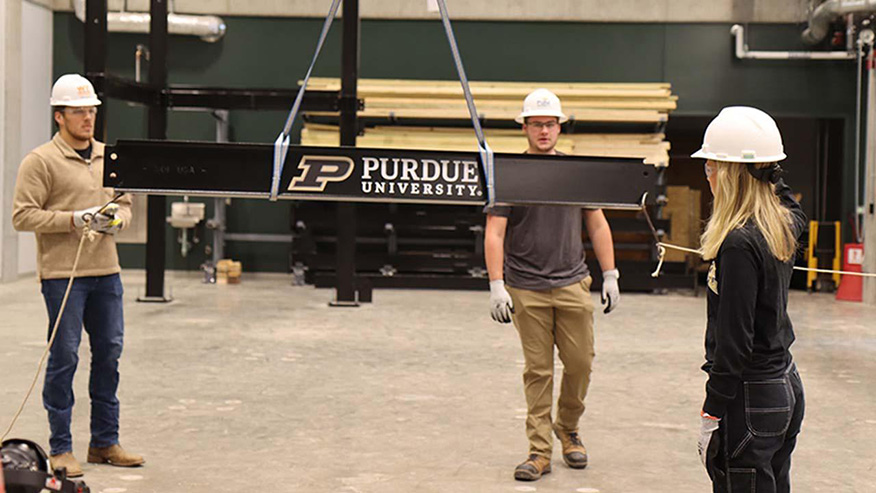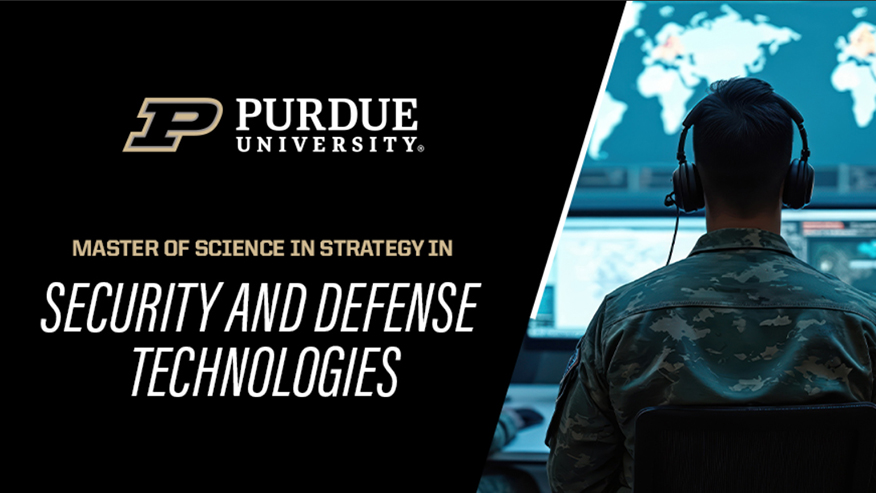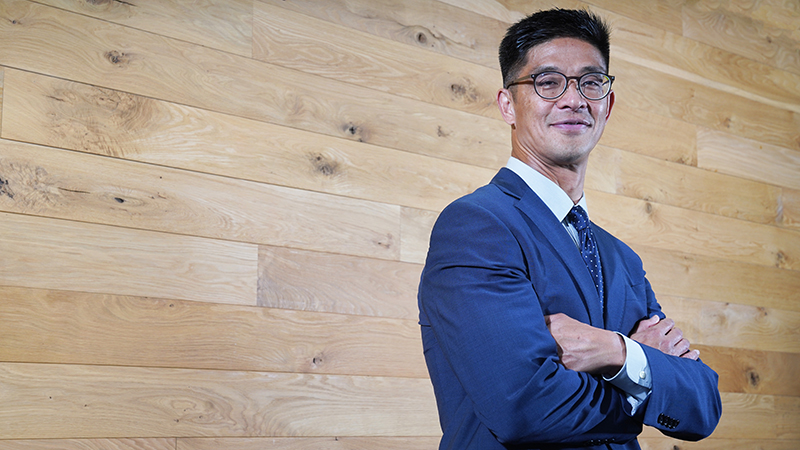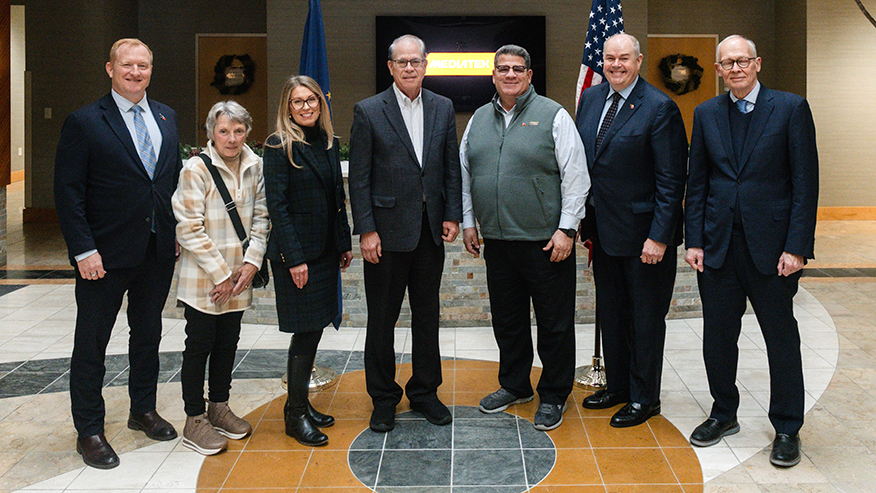April 25 Presidential Lecture doubleheader to feature 2023 Nobel laureate in chemistry Moungi Bawendi, plus NSF head Sethuraman Panchanathan and U.S. Sen. Todd Young
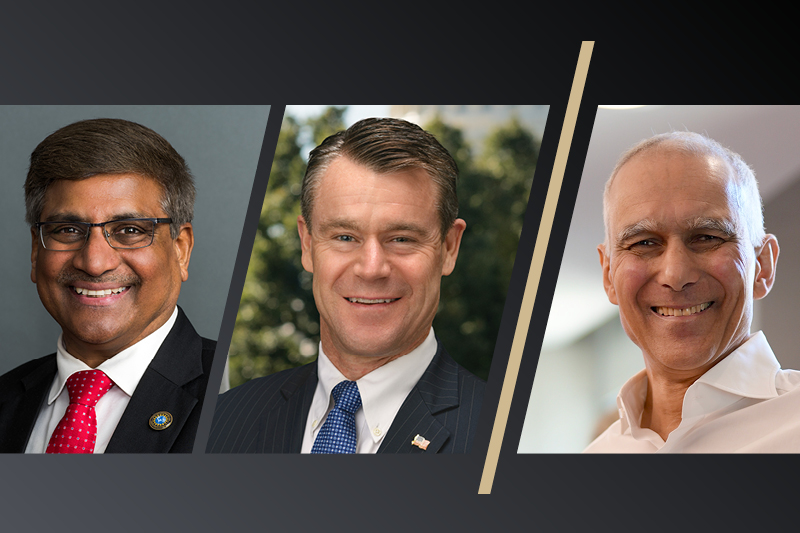
From left, Sethuraman Panchanathan, 15th director of the U.S. National Science Foundation; U.S. Sen. Todd Young, R-Ind.; and Moungi G. Bawendi, the Lester Wolfe Professor of Chemistry at the Massachusetts Institute of Technology, who shared the 2023 Nobel in chemistry.
WEST LAFAYETTE, Ind. —
Let’s talk two. Purdue University’s Presidential Lecture Series is delivering a day-night doubleheader April 25 that will feature the U.S. National Science Foundation director and a U.S. senator from Indiana, with the 2023 winner of the Nobel Prize in chemistry scheduled for the nightcap.
Kicking off the twin bill will be the NSF’s Sethuraman Panchanathan and Sen. Todd Young, R-Ind., who will join Purdue President Mung Chiang at 11 a.m. Thursday, April 25, in Stewart Center’s Fowler Hall for a fireside chat.

Later that day, Chiang will lead a conversation with Moungi G. Bawendi, focusing on his pioneering, Nobel-winning work in producing quantum dots, which are small particles whose unusual quantum properties depend on their size. That talk is scheduled for 6 p.m. in Elliott Hall of Music.
While both Presidential Lectures are free and open to the public, a separate ticket is required for each. Go here to register for the Panchanathan and Young event. For the Bawendi Presidential Lecture, go here.
“Purdue’s Presidential Lecture Series brings outstanding minds to dialogues on campus, and it so happens that scheduling availability landed us with two fabulous lectures on the same day in April,” Chiang said. “On that morning, Senator Young and NSF Director Panchanathan will share their insights on how research universities like Purdue, and states like ours, can lead in contributing to America’s scientific advancement. In the evening Bawendi, a Nobel laureate last year and a former student at West Lafayette Jr.-Sr. High School, will come home to discuss his journey of discovery and invention in the quantum world.”
The Panchanathan-Young PLS event was originally planned for Feb. 13 but was postponed because of the scheduling of U.S. Senate votes.
Additional information
About Sethuraman Panchanathan
Panchanathan (whose full name is pronounced Seth-u-ra-men Panch-a-na-than) was selected as the NSF’s 15th director in 2020 after serving as executive vice president of Arizona State University’s Knowledge Enterprise, where he also was chief research and innovation officer. He also serves as chair of the Interagency Arctic Research Policy Committee and co-vice chair of the Council for Inclusive Innovation.
A computer scientist and engineer, Panchanathan has had a distinguished career in higher education and government over three decades. He has designed and built knowledge enterprises that advance research innovation, strategic partnerships, entrepreneurship, global development and economic growth. His scientific contributions have advanced human-centered multimedia computing, haptic user interfaces and ubiquitous computing technologies to enhance the quality of life for those with different abilities; machine learning for multimedia applications; and media processor designs.
Prior to joining NSF, Panchanathan was appointed to serve on the National Science Board, where he was a chair of the Committee on Strategy and a member of the External Engagement and National Science and Engineering Policy committees. While he was at Arizona State, the university increased research performance fivefold, earning recognition as the nation’s fastest-growing and most innovative research university. He also was founder and director of ASU’s Center for Cognitive Ubiquitous Computing.
About Sen. Todd Young
A fifth-generation Hoosier, Young holds several leadership positions in the U.S. Senate, serving on the committees on Finance; Foreign Relations; Commerce, Science and Transportation; and Small Business and Entrepreneurship. In January 2009 Young announced plans to run for the congressional seat in Indiana’s 9th District as a Republican. He served three terms as a representative before launching his successful bid for U.S. Senate in 2016.
Young enlisted in the U.S. Navy and was admitted to the U.S. Naval Academy, where he participated in varsity athletics and was elected a class officer. Graduating with honors, he accepted a commission in the U.S. Marine Corps, training as a rifle platoon commander and serving as an intelligence officer. While stationed in Chicago, Young earned an MBA from the University of Chicago. Honorably discharged from active duty in 2000, he spent a year in England, earning a master’s degree from the School of Advanced Study in London.
Returning to the U.S., he joined the Heritage Foundation and later worked for U.S. Sen. Richard Lugar. In 2003 Young volunteered to work for Mitch Daniels’ successful gubernatorial campaign. He earned a law degree from Indiana University in 2006 and served as assistant deputy prosecutor for Orange County, Indiana. He founded the National Organization for People vs. Irresponsible Government Spending in 2007.
About Moungi G. Bawendi
Bawendi, the Lester Wolfe Professor of Chemistry at the Massachusetts Institute of Technology, was co-awarded the 2023 Nobel in chemistry in October, sharing the prize with Russian-born American physicist Aleksey Yekimov and American physical chemist Louis Brus.
Growing up in France, Tunisia and the United States, Bawendi attended West Lafayette schools while his parents taught at Purdue during the 1970s. His mother, Helene Baouendi, was an assistant professor of computer information systems from 1985-88. His father was renowned mathematician M. Salah Baouendi, who became a full professor at Purdue in 1973 and served as department head from 1980-87 before joining the University of California, San Diego in 1988.
In addition to his Purdue Presidential Lecture Series appearance in late April, Bawendi during that week will visit with students and teachers at West Lafayette Jr.-Sr. High School. A 1978 West Lafayette graduate, Bawendi was inducted into the school’s Wall of Pride in 2022.
Bawendi (whose full name is pronounced Moon-gee Bu-wend-ee) received a bachelor’s in 1982 and a master’s degree in 1983 from Harvard University before earning a PhD from the University of Chicago in 1988. He joined Bell Laboratories for two years of postdoctoral research, working alongside Brus, where Bawendi began studying nanomaterials. He joined MIT’s faculty in 1990, becoming an associate professor in 1995 and professor in 1996.
In 1993 Bawendi and his collaborators concentrated on forming high-quality cadmium selenide (CdSe) quantum dots. Through these efforts, Bawendi revolutionized the chemical production of quantum dots, resulting in almost perfect particles.
About the Presidential Lecture Series
Launched in 2014 by then-Purdue President Mitch Daniels and continued by President Mung Chiang, the Presidential Lecture Series exposes Purdue students and the broader community to inspiring ideas, courageous leadership, and models of civic engagement and civil discourse. The Presidential Lecture Series has had over 40 guests of many viewpoints and perspectives and hosted some of the great intellectual, business and civic leaders of our time. As one of the world’s premier centers of scholarly leadership, Purdue is — appropriately and necessarily — a regular venue for great thinkers across a wide variety of disciplines.
About Purdue University
Purdue University is a public research institution demonstrating excellence at scale. Ranked among top 10 public universities and with two colleges in the top four in the United States, Purdue discovers and disseminates knowledge with a quality and at a scale second to none. More than 105,000 students study at Purdue across modalities and locations, including nearly 50,000 in person on the West Lafayette campus. Committed to affordability and accessibility, Purdue’s main campus has frozen tuition 13 years in a row. See how Purdue never stops in the persistent pursuit of the next giant leap — including its first comprehensive urban campus in Indianapolis, the new Mitchell E. Daniels, Jr. School of Business, and Purdue Computes — at https://www.purdue.edu/president/strategic-initiatives.
Writer and media contact: Phillip Fiorini, pfiorini@purdue.edu, 765-430-6189
